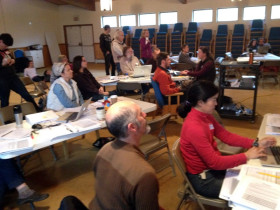There is a
r that talks about the importance of thinking beyond standard operating procedures. This is especially true in the farming and ranching industry, where it’s frequently necessary to think like a business person in order to increase net profit. Wearing an entrepreneur's hat is frequently avoided by farmers and ranchers, as they focus on their land, but overlooking the business side of farming and ranching can be detrimental to their business. Thinking more like an entrepreneur can mean increased net profit as producers turn their focus to creating unique products and ways to market them. Holistic Management practitioner Gabe Brown is a perfect example (Read more about Gabe Brown's Ranch). The Brown's practice holistic management on their ranch in North Dakota; and have used no-till farming since 1993. The use of cover crops has allowed them to eliminate the use of fertilizers and pesticides, which also increasing production - and net profit. At HMI, we train farmers and ranchers in regenerative agriculture techniques that are beneficial to the environment. But those techniques are also good for net profit as well. After all, long term, it doesn’t matter is a farm or ranch is sustainable if they are unable to remain in business. We know that tradition, love of the land, and a desire to do meaningful work all play a part in the decision to become a farmer or rancher. But farming and ranching is still a business. That’s why we created our Whole Farm Business Planning Training Series, which is designed to provide both new and experienced farmers and ranchers with the knowledge and tools they need to become and remain both sustainable and in business for the long term. By the end of the class, farmers and ranchers will walk away with a whole farm/ranch goal, a draft business plan, a financial plan, and a marketing plan. If you’re a farmer or rancher looking to think outside the box and change things up, be sure to visit our website for more information on our classes, and why Holistic Management training can be beneficial to the environment and the bottom line.

